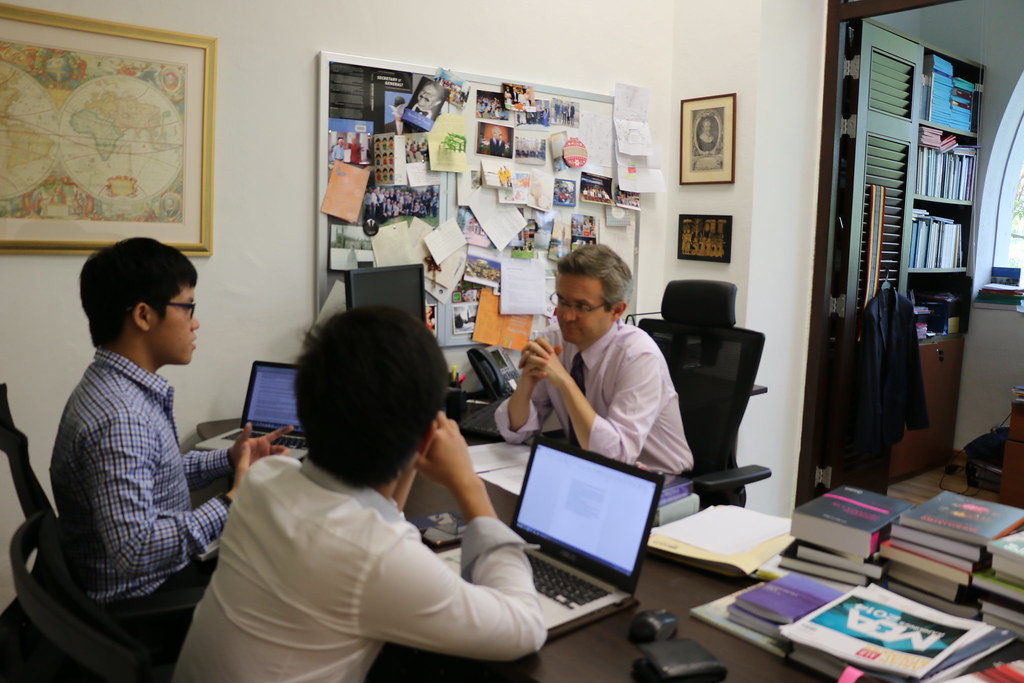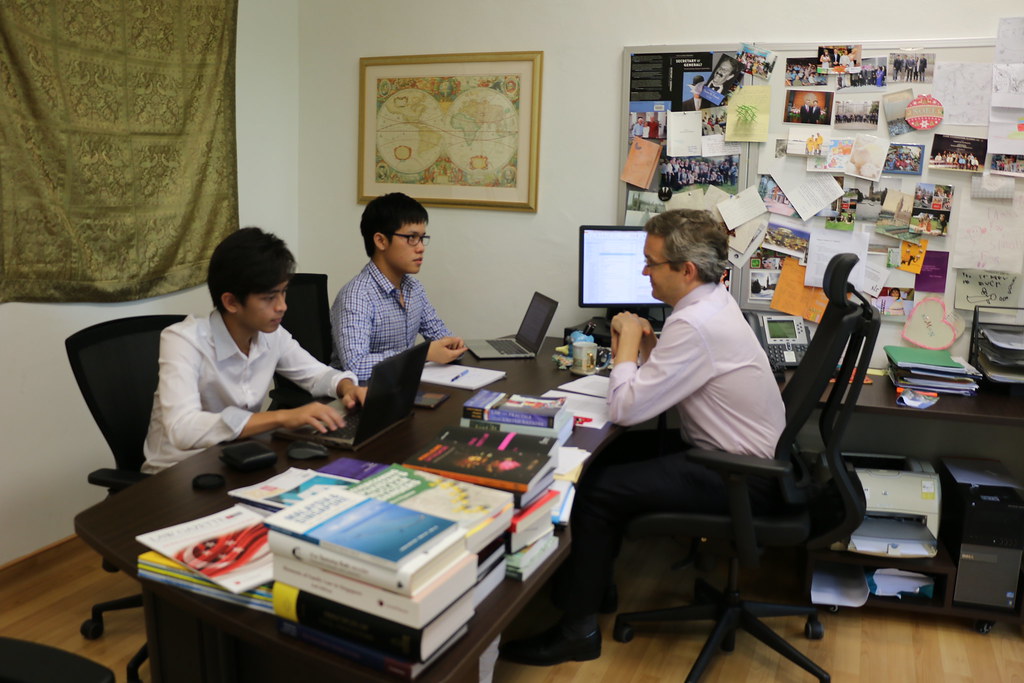
The past few months have seen a ruckus in the legal sector relating to the supply of lawyers. This began with Law Minister Shanmugam’s statements at the Criminal Justice Conference 2014, organized by NUS Law Criminal Justice Club (Article may be found at http://justice.sg/2014/08/21/criminal-justice-conference-2014/), and caused some consternation amongst our students. This confirmed the oft-stated rumour that training contracts have indeed become far more difficult to secure.
A number of questions arose. How did the oversupply come about? Will a further increase be seen? What would this mean for job prospects? Can the Ministry of Law do anything about this? Are there any measures in place to help us students? Is the increase in supply a calculated strategy to fill the demand for practitioners in community law?
Everyone wants answers and we here at Justified are no different. In fact, we probably want answers more than you do. Justified sought out and interviewed a number of individuals from the Deanery, Practice, and the Ministry. These interviews will be published in the course of the next few weeks.
We start the proverbial ball rolling with an interview with Professor Simon Chesterman, Dean of the Faculty of Law, National University of Singapore. Justified made the most of this opportunity, fielding questions about the state of the industry, student prospects, community law and his take on policy measures to address the situation.
Speaking in his disarmingly calm yet persuasive tone, Professor Chesterman came across as equally concerned and optimistic about the supply of lawyers. He reassured us with the confidence he had in his students, but also highlighted the practical need to consider alternative career routes. Further, he shared with us a series of initiatives by the Careers Preparation Team, specially tailored to give students the best start the school can provide.
Justified: It’s well known that the oversupply of law students is attributable to the foreign influx of students. Did you ever anticipate this?
Professor: I was on the 4th committee of the supply of lawyers. We knew about a growing number of students -Singaporeans- going abroad to study in Australia and to the UK. However, we couldn’t control this from Singapore. This was up to the foreign Universities, and the ability and willingness of Singaporean families to fund an education overseas.
A couple of factors increased this number; the desirability of a law degree, the perception that a Law degree is the path to prosperity, the strength of the Singapore Dollar relative to the Pound. Furthermore, many law schools in the UK found Singaporeans desirable. International fees are a big source of revenue. Singaporean students work relatively hard and don’t drink as much.
We at NUS run the part A conversion course. In the past 2 years the number of students taking the course has grown larger than our largest lecture theatre, so we run that course with overflow rooms. We certainly know that the numbers have been going up.
Justified: Is this a personal concern of yours and of the school? Will this have an effect on NUS Law?
Professor: I moved to Singapore in 2006, when SMU was just starting school, and I was in the minority that believed that having some competition was the best thing that could happen to NUS. Competition forces us to think carefully about why we do the things we do, and to encourage our students to do the same.
A low number of law students entering the market is not a good thing- in fact one of the reasons people go overseas is because of how hard it is to get into a local law school. A lot of people studying in England and Australia are doing it because they didn’t get into either NUS or SMU.
Is this a problem? It is if you believe that every student must get a Training Contract and must Practice Law, and it’s a fact that not all of our students do that. A lot of our students go on to further studies, some leave the law and start businesses, open cake shops et. cetera.
One of the things I’ve been keen to promote is the idea that every law student who wants to practice,and has the ability to practice- we will do everything to assist them to get there. But we don’t expect all of our students all to stay on as lawyers for the rest of their lives. That doesn’t happen.
I don’t see students working harder to find a training contract as a catastrophic problem. That said, it places an onus on the school to work harder at career preparation. 8 years ago NUS Law didn’t have a careers office as essentially every student graduated and went on to work for one of four law firms.
Now we’ve got a full time careers officer and the office of student affairs. We’ve appointed a new Vice-Dean of student affairs; Eleanor Wong, we’ll revamp the student’s affairs portfolio and create a careers committee with the focus on career preparation for students.
Justified: What sort of measures are you thinking of to help our students? Could you tell us?
Professor: It’s not confirmed yet, but here’s what we have so far. Some firms believe salaries are too high for Trainees, and that makes it difficult for some firms to take them on. That perhaps could be looked at. However neither I nor the Government want to fix salaries for our students. But I think we can expect more Training Contracts to be available. While number available hovers at around 490, it would be a good thing if more were available.
We’re thinking about the moratorium. A moratorium agreed between NUS and SMU wouldn’t bind the foreign students, and probably wouldn’t be a good idea. But suppose we create a structured way for firms to compare like with like, rather than letting people jump ahead of the market. I support an idea like that. I believe our students will do well in any face-to-face competition.
Justified: I’ve been looking at the rates of NUS law students, with extremely high rates of employment: how many of them were legal or non-legal? Do you have those statistics?
Professor: We don’t have the precise statistics. Nevertheless, we are very proud of the very high level of employment and high salaries achieved by our students.
However, I don’t like the language of attrition. Someone going in-house still contributes to society with a law degree. Someone who becomes a homemaker contributes as well. In the past, we celebrated our alumni that went on to succeed in legal careers. Now we’re trying to celebrate our alumni who went on to succeed in other things as well; playwrights like Ivan Heng.
I do think there are more pathways available for our students, but I still expect the vast majority to go on to getting Training Contracts and Legal Employment.
Justified: What is the school planning for career preparation?
Professor: We’re trying to ramp up career preparation programs. We already have LAMP, interview training sessions, CV building, and some new programs- like programs targeting women lawyers for example. We’re engaging the profession to expand internship opportunities locally and internationally. We’re hoping to see more opportunities for out students when Singaporean firms follow the footsteps of Rajah and Tann to set up regional offices in Asia. We’re also looking at setting up internship opportunities in in-house counsel positions, especially with banks. These are additional career opportunities.
However, one thing we’re still contemplating is how much of these programs should be made compulsory. I don’t want to implement a compulsory program like Finishing Touch in SMU, but I think it’s disappointing that students don’t take advantage of our career preparation opportunities. I think it’s unfortunate that our students revise so much for exams but don’t always practice for interviews. I don’t want to force students to ‘eat their vegetables’, but we want to make it hard for one to go through without making a conscious decision to refuse career help.

Justified: Recently, practitioners have suggested alternate career paths instead of practicing law in a law firm. Alternate paths include the job of an in-house counsel, or a career in community law. Do you anticipate a diversification of jobs in the years to come?
Professor: I see the them expanding. I hope our students continue to be regarded as premier law graduates in Singapore and around the world. One reason why NUS Law does well in international rankings is really on the strength of the reputation of our students amongst firms, local and international.
I appreciate that these (alternate routes) cause students some anxiety. It’s much easier when you know your next step is to get a job at one of four large firms. There is a degree of uncertainty when you have to consider a lot more options.
That being said, I believe the vast majority of our students will want to get qualifications in Singapore, hence we are working with the Singapore institute of Legal Education to look at the way Training Contracts are administered. We are looking at ways, not to regulate the market, but to ensure that the market operates in a way that is fair to everyone. That would be good thing for our students as I believe our students are better than the competition. I was partially quoted in the Straits Times – that if you get a first class from Oxford or Cambridge that’s fine- but I also said that NUS and indeed SMU are far better at educating students to work in Singapore than any English or Australian University.
Justified: At this point in time, law students don’t see criminal law to be as attractive as a practice in corporate. Do you think criminal law is a viable sector for a student to begin practice?
Professor: We academics interview students before they start law school. We find it interesting that then, we get answers like ‘I want to defend the innocent! Change the world! Help the poor!’ and then when they graduate all they want to do is earn packets of money (laughs). I’m exaggerating slightly but there are students who enter law school wanting to help society, but not all make it through law school maintaining that view.
One of the reasons- this is a separate matter- we’ve pushed for mandatory pro bono is to demonstrate the difference a student can make in a person’s life.
Coming back to the question- well if that’s where you think your career is going to go, then absolutely! You have to find the right people and right firms. The honest answer is that these are firms with fewer resources and less pay, but if it helps you feel good about yourself, I think that’s much more important than getting even a couple thousand more dollars.
That is something our career office will try to help students see. I suspect that some students go down the path of corporate law because everyone else does the same. We want to help people do that if it’s what they want, but we want them to make an informed choice.
Justified: We’ve talked to students about community law and found out that not many take up internships or positions in departments specializing in criminal or family law. This was largely due to a lack of opportunities available. This is very disconcerting as the legal sector has stated many times that there exists a huge shortage of lawyers practicing community law. What do you think the problem is?
Professor: The problem is that internships aren’t much help to a firm. Most firms see internships as a form of obligation or an extended interview. Not many of the small firms have the excess capacity. Sometimes, providing a desk and computers can be a problem. Therefore I think Pro Bono is a vehicle that can give students more experience.
We still would like to expand internship opportunities in this area though. We are talking to the firms.
Justified: Wouldn’t it be far better to secure internship opportunities with these firms? Using Pro Bono as a vehicle for experience might reinforce the cynical perception that there is no money to be made in the Criminal Sector. Can anything be done about this?
Professor: Well it’s not a perception, it’s generally true, but the average criminal or family law defence lawyer will earn less than the average corporate lawyer. But that’s not the only measure of success.
There is a danger in the over-reliance of Pro Bono work, that it takes away the most interesting work from practitioners. This is a concern around the world. One way to address that is to pay for Pro Bono work, or to consider law of public funding.
There is a market there. I think one reason that the Chief Justice mentions this repeatedly is that as the median age of practitioners in this sector age, justice will eventually become more expensive than people can afford.
There will be some kind of market push. one thing that I think could happen would be that the overseas law students who don’t get training contracts might be pushed to look to more opportunities and look at these areas of law.
Justified: You sit on a number of committees that deal with the supply of law students. What is their perception? Are they concerned about the supply and wish to rein it in? Or do they believe it to be a happy situation where firms get their pick of students from a larger pool?
Professor: I think happy and unhappy isn’t the thing. A committee isn’t happy about anything. A committee does a job.
It’s impossible for the market to be satisfied exactly, and we don’t want to try to satisfy it exactly. We want a slightly larger number because of the attrition rate, the other option would be to bond students to a particular career path like medicine does. We don’t want to do that.
As a committee we had no control over the number of scheduled universities, but there’s a review due soon. I’m not on that committee but I would be astonished if the number of universities increases, and I would not be surprised if it went down.
But as to the number of students going abroad, we can’t control that number. We can’t tell Singaporean students not to spend money and go overseas. But we can show them that that students who go to a -lets call it a second tier English University and get a degree- their prospects are much less than the students studying here.
I think one of the reasons why the Minister made the comments about the glut is to get students to consider that going abroad to study law isn’t always the best idea. My hope is that students who didn’t get into NUS or SMU Law take a different career path. But I understand law is a desirable degree. If they do make that decision I hope they understand that many students who study Law never practice Law. It’s a trend we see in countries like Australia and the United States where half of the Law Graduates don’t practice law after graduation.
My hope is that students and parents will manage their expectations- that students who study law may not become a lawyer. But in the case of our students, I want every student who wants to get a training contract to get a chance to get a training contract.
Justified: A chance? Not get a training contract?
Professor: (Laughs) It’s not desirable to force firms to give Training Contracts, after all students must succeed on their own merit. We can’t guarantee employment, but we want to give our students the best possible chance. If we get 100%, I’ll be very, very happy.
Article by:


Photography by:






